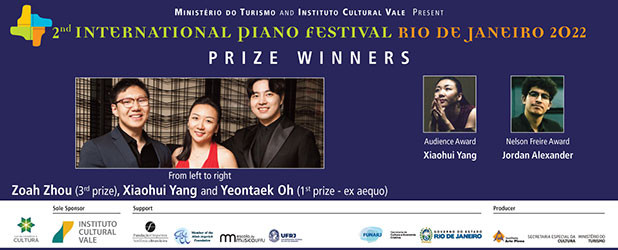November, 2011
The BNDES International Piano Festival opens in Rio’s Opera House; the authors of “Guiomar Novaes of Brazil” sign the book
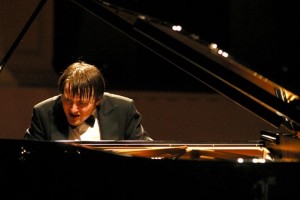
Pianista Daniil Trifonov plays at the Rio Opera House
At 11 a.m. on Sunday, December 27, 2011, from the stage of Rio’s opera house, Julio Ramundo, Director of BNDES, officially inaugurated the BNDES International Piano Festival, the precursor of the Piano Competition which has returned to Rio de Janeiro its place on the world stage among cities recognized as centres of music.
The next speaker was the Vice President of the Bank, Armando Mariante, who recalled the birth of the project during his administration – he was the key figure in obtaining the support of the bank for the Competition – coordinated then, as now, by Lilian Barretto. “The book that we are launching has a special characteristic; through careful research it has brought us valuable previously unpublished information on the life and career of Guiomar Novaes in New York (…) and is accompanied by two CDs of Guiomar playing with the New York Philharmonic in the 1950s and 60s.”
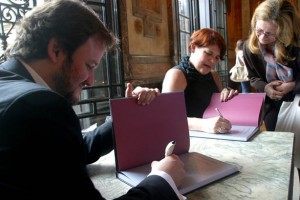
The authors of “Guiomar Novaes of Brazil” sign the book at the opening of the Festival
Joined by the authors of ‘Guiomar Novaes of Brazil’’ – Luciana Medeiros and João Luiz Sampaio, the festival coordinator Lilian Barretto and Guiomar Novaes’ grandson, Luiz Felipe Camargo Pinto (who was accompanied by his son Luiz Eduardo), Julio Ramundo and Armando Mariante also presented the Steinway concert piano acquired by the BNDES International Competition.
Next the Steinway was inaugurated by the twenty-year-old Russian pianist Daniil Trifonov, outright winner of the Tchaikovsky Competition of 2011. He played Chopin, Liszt and Liszt transcriptions of Schubert and Paganini. In the words of José Schiller, who presents the programme A Grande Música on TV Brasil and is also a musician: “A phenomenon, a talent that is still maturing, but with extraordinary dynamics and incredible musicality. Very expressive”. The lawyer Alexandre Martins, an amateur music lover, applauded the concert to which entrance was free: “This festival opening does more than credit to Guiomar Novaes’ instrument; it was a beautiful concert”.
After Trifonov’s recital the authors signed the book in the theatre foyer.
Photos of the opening of BNDES International Piano Festival – 2011
Clóvis Marques’ criticism in Monday’s Opinião e Notícia newspaper
 “He is from the era of the Internet; she from that of the gramophone. He can be heard instantaneously on YouTube; her recordings need to be recuperated. He plays with an appetite bordering on fury, but not without delicacy; she also had fire, with the strength and courage that lay behind a musical personality that emphasised cantabile and beautiful sonority.” This is how Clóvis Marques’ criticism in Monday’s Opinião e Notícia newspaper begins (November 28). See below the main passages:
“He is from the era of the Internet; she from that of the gramophone. He can be heard instantaneously on YouTube; her recordings need to be recuperated. He plays with an appetite bordering on fury, but not without delicacy; she also had fire, with the strength and courage that lay behind a musical personality that emphasised cantabile and beautiful sonority.” This is how Clóvis Marques’ criticism in Monday’s Opinião e Notícia newspaper begins (November 28). See below the main passages:
Guiomar Novaes is recalled in a book and a festival that brings the winners of important international piano competitions to Brazil.
Seeing DaniilTrifonov play a recital dedicated to Chopin and Liszt in Rio’s Opera House – on a brand new Steinway donated by BNDES to the Brazilian Symphony Orchestra – was moving and enlightening.
Moving because the young man plays with a commitment and brilliance that are not only those of a bête à concours: with his longs arms and hands, the physical involvement that uses the entire body, giving the shoulders a central role. Trifonov will no doubt soon have much to say, perhaps when he no longer dedicates his recitals to pieces that show off his technique.
Enlightening precisely because bringing together in a programme only those piano pieces in which Chopin and Liszt give the pianist the greatest opportunities to show off the capacity of his fingers, speed and virtuosity in the strictest sense, can be frustrating: being overwhelming can be tiring…
Even so, it is not easy to find a pianist today who plays Liszt’s transcription of Paganini’s Campanella or Liszt’s first Mesphisto Waltz; this latter with such clarity in the multitude of voices and dynamics, with such control and profusion of sonority. In the Liszt adaptation of Schubert’s Trout Quintet, the volubility of aquatic images was amazing. In the Chopin Études Op 10, if at times the excessive speed and showing off is a little off-putting, Trifonov also enchants us with the ethereal grace of his touch, the brilliance of the sound, a certain corporal, palpable aspect to his féerie, as in Étude nº 8.
Guiomar recalled
Sampaio and Medeiros’ book is not the first (they themselves quote Guiomar Novaes: Uma arrebatadorahistória de amor, by Maria Stella Orsini), but is certainly a novelty as regards the seriousness of its research. The book is centred on the pianist’s life in New York, where she built her career between the 1920s and her death in the 70s, which is places in the context of her whole life and career, as well as examining the great appreciation of her art, backed up with an abundance of testimony and sources.
João Marcos Coelho’s criticism in the Estado de São Paulo of the BNDES International Piano Festival and the book ‘Guiomar Novaes of Brazil’
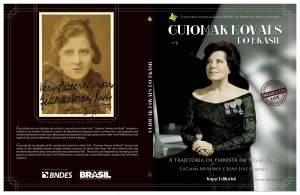
In this Saturday’s Estado de São Paulo newspaper, the critic João Marcos Coelho writes about the BNDES International Piano Festival and the book Guiomar Novaes of Brazil, by Luciana Medeiros and João Luiz Sampaio, that will be launched this Sunday, November 27, at 11 a.m, with a recital by the Russian pianist DaniilTrifonov in the Rio de Janeiro Opera House. “Do the book and the recordings now brought before the public for the first time add to the biographical and professional information about Guiomar Novaes, and above all to Guiomar as an interpreter? In both cases the answer is most certainly yes”. See below the main passages of the article:
Do the book and the recordings now brought before the public for the first time add to the biographical and professional information about Guiomar Novaes, and above all to Guiomar as an interpreter? In both cases the answer is most certainly yes. To begin with, anything relating to Guiomar Novaes is a motive for celebration, as more than thirty years after her death, in March 1979, we still know very little about this extraordinary pianist, who is rightly placed among the greatest of the 20th century.
Reading this book is also an indication that fortunately we have gone beyond the point of mere fan admiration in this type of literature. Guiomar Novaes of Brazil inaugurates a new era of selective, objective research about the pianist, focussing above all on her years in the United States, which represent over half a century of intense activity. Much of the data collected by Sampaio and Medeiros speaks for itself: between 1916 and 1966 she presented 27 different programmes in 51 concerts with the New York Philharmonic. During this period she was conducted by such distinguished maestros as Wilhelm Furtwängler, John Barbirolli, George Szell, André Cluytens and Leonard Bernstein.
….
As can be imagined, everyone writing in the North American press wanted to decipher the Guiomar Novaes enigma. Noel Straus, for example, defined her as belonging to the “class of pianists with more vivid imagination that tend to recreate a given composition differently at each presentation of it, according to the mood of the moment.”
In other words, intuitive, like Nelson Freire today. Straus came very close. However, on page 131 Sampaio and Medeiros seem not to agree with this “picture of a purely intuitive artist, unable to articulate her art in an intellectual way.” And whom do they quote? Precisely Nelson Freire, another intuitive artist who cannot, or rather does not wish to, explain his art. He prefers to demonstrate it by playing, like Guiomar. Freire never repeats an interpretation. He is not like those musicians who prepare an interpretation of a piece of music and then freeze it. A point to Guiomar and a point to Neslon, without a doubt.
…..
To sum up, he and she, with identical DNA, offer the “mood of the moment” on the stage. And it is here that the charm and geniality of Guiomar lie – and those of Nelson. He also shares with her his relationship with the instrument. “Pianos have a soul,” she says. “This piano doesn’t like me,” Nelson observes, looking distrustfully at the Steinway in the Sala São Paulo in João Moreira Salles’ documentary.
There is still a lot missing before we have a complete picture of Guiomar Novaes. There are still people who have important collections about her, but in their provincial way think they are the ‘owners’ of this documentation to which the world has a right. This book and the two CDs, without a doubt, mark the beginning of more professional research into the “country of pianists” as Mário de Andrade would have said.’ / J.M.C.
A profile of Daniil Trifonov – the young pianist, first Prize of Tchaikovsky Competition/2011 – was published on Russian newspaper
Trifonov is opening the BNDES Piano International Festival in Rio this Sunday, November 27th, 11:00 AM, atTheatro Municipal of Rio de Janeiro. Below, you can read the original article.
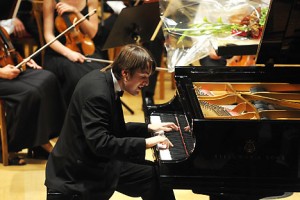 “Young Russian pianist DaniilTrifonov begins his conquest of the world”
“Young Russian pianist DaniilTrifonov begins his conquest of the world”
November 8, 2011
AyanoHodouchi
At 20, pianist DaniilTrifonov is winning global recognition for the fanatic fervor he expresses toward his music.
DaniilTrifonov, a 20-year-old pianist from Nizhny Novgorod, has only begun the hectic and exhausting life of international touring. During a recent concert in Guildford, England, the lights went out in the middle of the first movement. Trifonov continued playing in complete darkness – a feat anyone who knows the Tchaikovsky Piano Concerto No.1 would consider impossible – but he merely smiled and said with irony, “[playing] the cadenza without lights – that’s a spectacular experience for the performer.”
The day before his Carnegie Hall debut in October, I found Trifonov backstage, nibbling on a small bag of nuts. “I don’t always have time to eat, but I make time to practice,” he said, referring to his impromptu lunch.
Pale and slight of build, the 20-year-old still looks like an adolescent, but he is becoming known as a comet of fierce musical talent, an unassuming young man who approaches his music with a focus nearing fanaticism. As we talk, I realize that he has hardly been touched by his sudden stardom and that all he cares about, still, is the music. The rest – the jet-setting life, the many concert halls and the fawning admirers–don’t seem to really exist. Withdrawn and serious, he has a studied indifference to the hype around him rather than the casual nonchalance of more seasoned artists. He speaks hesitantly and tersely, searching for words and ending many of his sentences questioningly, as if unsure if he had found the right words to convey his meaning.
Trifonov has had a whirlwind year since he won third prize at the XVI International Chopin Piano Competition in Warsaw last autumn. Prizewinners’ concerts took him around the globe, then in May he won the Arthur Rubinstein International Piano Master Competition in Tel-Aviv, which sparked off a dizzying two weeks of concerts. In mid June, the day after those concerts ended, he arrived in Moscow for the International Tchaikovsky Competition.
At the finals, Trifonov set himself apart from the others by performing Chopin’s Piano Concerto No.1 instead of typical heavy competition fare such as Rachmaninov’s Piano Concerto No.3 (which three of the five finalists played). Initially, Trifonov, like almost all other ambitious boys, wanted to learn the darkly resplendent Rachmaninov 3. He wanted the challenge, he told his teacher at the Cleveland Institute of Music, Sergei Babayan. He argued that no one had ever won this competition by playing Chopin, to which his mentor replied, “Prove that you can win by playing Chopin. If no one has done it before, be the first to do it.”
And he did, to the delight of many. Over the past two decades, the competition had lost its prestige, earned a corrupt reputation and turned out winners the public was not satisfied with. Its reputation had fallen so low that the Russian culture ministry intervened in 2010, appointing conductor Valery Gergiev chairman and tasking him with reviving the competition’s old glory. Deep-rooted distrust is hard to overcome. Here, however, was a winner everyone could love. It was like the good old days when stars were born from the competition.
“Great artists such as Van Cliburn and GrigorySokolov won this competition. As a Russian, it has a great significance for me – it was one of my dreams,” Trifonov said.
After his win, Trifonov was swamped with concert offers. He received 150 for the following 12 months, and whittled it down to about 85. “At my age, 150 would be suicidal,” he said. Though time is scarce, he usually sets aside five to seven hours a day for practicing.
Born in Nizhny Novgorod, Trifonov moved to Moscow when he was nine to study with Tatiana Zelikman (whose other famous pupils include Konstantin Lifschitz) at the Gnessin Special School of Music. He stayed with her until he was 18 then came to the United States with a scholarship from the Guzik foundation. Zelikman recommended him to Babayan, with whom he still studies in between concerts, whenever he can – sometimes for hours day after day.
That he does so is apparent from the way he plays, as if nothing else exists in the world. His concentration and focus are remarkable. As Irish pianist Barry Douglas noted, Trifonov “plays with a passion and sincerity that touches the audience.” He is completely absorbed by the music he plays, and his belief and trust in his mentors – Zelikman in Moscow and Babayan in the United States – are unshakeable. The latter’s influence is apparent in his playing; some of Trifonov’s most engaging characteristics, such as the unusual elasticity of his intonations and his attention to finer details, are from his mentor.
Music critic of The New York Times Anthony Tommasini pointed out that Trifonov still needs “artistic mentoring and guidance.” The audience may love him for his “boyish appeal and phenomenal virtuosity,” but he cannot capitalize on that forever. The novelty of youth wears off quickly, and audiences may turn their fickle attention to the next new young talent – if the grueling touring schedule doesn’t make him burn out first.
At his Carnegie Hall debut last month, Trifonov performed the Tchaikovsky Piano Concerto No.1 with Valery Gergiev and the Mariinsky Theater Orchestra. His Tchaikovsky was not typical hearty Russian music; it strove to be something more refined and striking. While his delicacy made for some exquisite moments in the second movement, it didn’t always work out well, especially in the first and last movements where he seemed to lose sight of the bigger picture. He contorted each phrase into something exceptionally delicate, but with so much focus on details, the sonorous richness of the music was lost, making it a little brittle. Nonetheless, he roused the audience to a frenzy of admiration.
There is no doubt that he is a young man of prodigal capability. Yet, he is unlike any of the other extremely talented pianists we see cropping up by the dozens. What in him sweeps listeners off their feet?
“If I say that Daniil has a sophisticated emotional palette, an open, pure, passionate heart, sharp musical intellect and absolutely effortless pianistic facility – that will not define what really makes him so special,” said Babayan. “The most important thing is his overwhelming love for music. It is disarming.”
Indeed, in a world where so many artists vie for our interest, push their interpretations at us and try to impress us with their prowess and charisma, Trifonov disarms us with his more modest approach. He does not use music as a canvas for his own personality; he plays to embody music. His playing has no ego in it. He is transparent; untainted by the need to give a part of himself to the audience. He just wants you to hear the music. He is a vessel for the music he plays, and as such, an ideal one.
The Brazilian pianist Fabio Martino, who is to play in Rio de Janeiro on December 6, made his North American debut in Des Moines
Critic of the Des Moines Register praised the performance and commented good-humouredly: “he may have grown a secret third hand”
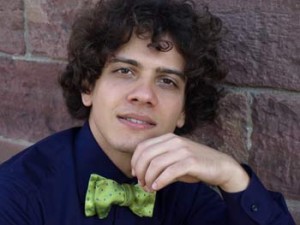 The United Statesdebut of the pianist Fabio Martino took place on October 22 in Des Moines, and was highly praised by the critic of the Iowa capital’s principal newspaper. The North American critic emphasized the fluidity of the phrasing and the clarity of the Brazilian pianist’s interpretation of the Schumann A minor concerto, conducted by Joseph Giunta – who was on the panel of judges at the BNDES II International Piano Competition of Rio de Janeiro.
The United Statesdebut of the pianist Fabio Martino took place on October 22 in Des Moines, and was highly praised by the critic of the Iowa capital’s principal newspaper. The North American critic emphasized the fluidity of the phrasing and the clarity of the Brazilian pianist’s interpretation of the Schumann A minor concerto, conducted by Joseph Giunta – who was on the panel of judges at the BNDES II International Piano Competition of Rio de Janeiro.
As an encore Martino played a piece by Nikolai Kapustin “For the Seconds” Etude No. 1, Opus 68, which he presented in the semi-finals of the Rio de Janeiro 2010 competition. Morain recommends his readers to have a look on Youtube at the recording of the Brazilian competition commenting “all 10 or 15 of his fingers raced along in perpetual motion”.
Martino is to play at the Salão Leopoldo Miguez of the Federal University Music School in Rio on December 6, after playing in Fortaleza on November 30 and in Belem on December 4.
BNDES International Piano Festival brings the great winner of the 2011 Tchaikovsky Competition
Young Russian pianist is invited to play in Brazil by the Festival after winning First Prize in Moscow last July
In Rio a new concert piano acquired by the BNDES International Piano Competition
The Steinway made apparatus will be inaugurated on November 27 by por Daniil Trifonov at the 2011 Festival opening in Theatro Municipal of Rio de Janeiro
Read the rest of this entry »
Competition releases “Guiomar Novaes do Brasil/of Brazil” – a book
Release to happen at the opening of BNDES International Piano Festival on Sunday, November 27, 11:00 am in Theatro Municipal of Rio de Janeiro, with a free admission concert by Daniil Trifonov
Read the rest of this entry »

